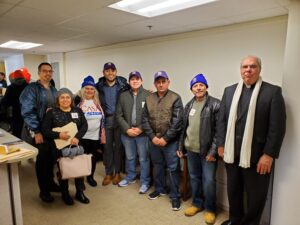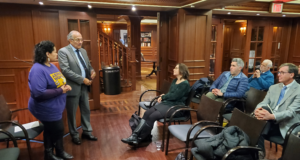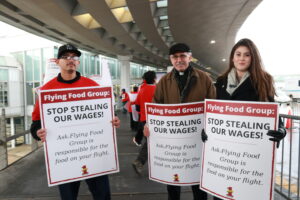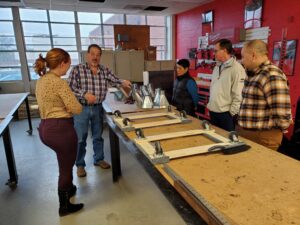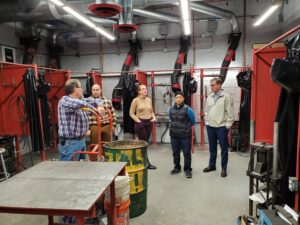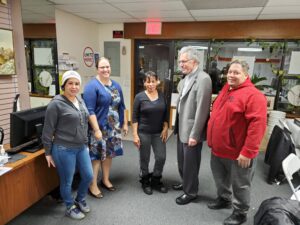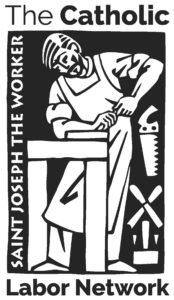The Working Catholic: Christmas Shopping Part II
by Bill Droel
Clothes were once made in the U.S. Yes, labor abuses occurred in our domestic production–in cotton plantations, mills and factories. Conditions greatly improved, however, with the labor laws and reforms introduced by President Franklin Roosevelt (1882-1945) and his Labor Secretary Frances Perkins (1880-1965).
Through the post-World War II years, New York City’s Garment District “had more apparel factories than anywhere else in the world,” Dana Thomas, a fashion expert based in Paris, writes in Fashionapolis (Penguin, 2019). From there production expanded to Bronx, Brooklyn, Rochester and Chicago; and in the 1970s to NYC’s Chinatown and to Los Angeles.
Starting in about 1980 two trends converged to create the apparel industry as we have it today. First, President Ronald Reagan (1911-2004) encouraged free trade deals. It soon became more profitable for clothing companies to import from countries where wages are low and building standards are nearly nonexistent. Second, fast fashion became the new concept. U.S. consumers, even those with money, crave cheap clothes—everything from socks to formal wear. Consumers shop “off-the-rack” or expect “next day delivery” from retail outlets where wages are relatively low.
How many clothing items per U.S. shopper? Jessica Iredale writes about blue jeans for Wall St. Journal (12/1/19). “Staying on trend can be an exhausting, not to mention expensive exercise in denim acrobatics,” she says. She has 18 pairs in her closet and a few more in storage bins under her bed. Of these, Iredale has three “in regular rotation.” The others are mostly out of fashion. By one estimate, the average number per U.S. adult (women plus men) is seven pairs in the closet. That adult regularly goes to the alley or resale shop because that adult buys four new pairs per year. Each shopper (including those shopping for their children) buys 68 garments per year.
There are varying degrees of exploitation involved in the overseas production of each garment. The most harrowing production is in Bangladesh, Thomas details. There are thousands of apparel factories there, employing 40million workers. The doors are locked at many of those plants in order to keep workers from leaving during the day. The world learned of this inhumane practice in April 2013 when the Rana Plaza collapsed, killing 1,134 workers and injuring another 2,500. The Rana Plaza tragedy “is the impetus” for every subsequent improvement in Bangladesh manufacturing, says Thomas.
Thomas summarizes the reforms that occurred and didn’t occur after the Rana Plaza collapse. IndustriAll Global (54 bio Route des Acacias, Geneva, Switzerland; www.industriall-union.org) developed the Accord on Fire and Building Safety (www.bangladeshaccord.org). About 200 fashion lines and retail outlets signed up. Teams of engineers, including leaders from Canada, made the rounds of Bangladesh factories. The Accord participants were mostly European firms. The U.S. firms, spearheaded by Walmart, started the Alliance for Bangladesh Worker Safety, similar to the Accord. However, the U.S. Alliance is voluntary and uses in-house inspectors. Human rights activists believe it is deficient.
President Donald Trump is interested in the U.S. trade deficit. The apparel industry which thrives on free trade and on consumers’ desire for fast fashion annually accounts for $77billion of the trade deficit, according to Thomas. Might Trump find ways to bring clothing manufacturing back to the U.S.?
His original MAGA hat was “assembled in the U.S.A.” (The hats could not say “made in the U.S.A.”) The MAGA hat is now a knockoff, selling for $6.99 from 16 importers. All the other items in Trump’s failed clothing line were foreign made, including in some sweatshops. White House advisor Ivanka Kushner’s apparel items, a line which went under in July 2018, were imported from China, Indonesia and Bangladesh. The Kushner subcontractors employed women toiling in sweatshops. Thomas begins her book with details about Melania Trump’s cynical jacket, worn on a 2018 visit to a detention center. It cost $39 from a Spanish manufacturer (unless our government overpaid for the item).
On short notice it will be difficult to buy completely clean clothes during this holy season. A donation to a human rights group is appropriate. I recommend International Labor Rights Forum (1634 I St. NW #1000, Washington, DC 20006; www.laborrights.org) and Worker Rights Consortium (5 Thomas Cr. NW #500, Washington, DC 20005; www.workersrights.org).
Social justice is a relatively new virtue in that it once was not possible to do anything about wrongdoing that occurred in remote locations or in complex systems. Today social justice, though difficult, is possible. Action on behalf of justly-made clothes is possible and, thanks to conscientious students, many consumers and a few sophisticated groups, there is momentum behind justice in the clothing industry.
Droel edits a newsletter on faith and work, INITIATIVES (PO Box 291102, Chicago, IL 60629)
